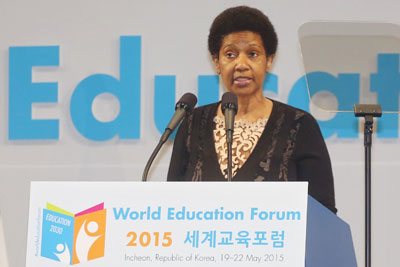Press Release: World Education Forum will set roadmap for global education until 2030
Date:

Incheon, Republic of Korea – The global education agenda for the next 15 years will be discussed at the World Education Forum 2015 (WEF 2015), which opened today in Incheon, Republic of Korea. The conference will set out a global roadmap for education until 2030.
The Declaration on Education 2030 to be agreed at the Forum will mobilize all countries and partners to implement the new agenda, and propose ways for its coordination, financing and monitoring – globally, regionally and nationally – to ensure equal educational opportunities for all.
“Education secures human rights, including health and employment,” UN Secretary-General Ban Ki-moon said, as he opened the event attended by 1,500 participants. “And education is also essential to fighting security threats, including the rise of violent extremism.”
The Forum brings together more than 130 government ministers, along with high-level government officials, Nobel Prize Laureates, heads of international and non-governmental organizations, academics, representatives of the private sector, researchers and other key stakeholders.
UNESCO Director-General Irina Bokova, and President of the Republic of Korea, Park Geun-hye, also spoke at the opening of WEF 2015, which UNESCO is leading in collaboration with UNDP, UNFPA, UNHCR, UNICEF, UN Women and the World Bank Group.
“We know the power of education to eradicate poverty, transform lives and make breakthroughs on all the Sustainable Development Goals,” said Ms. Bokova in her opening address. “We have the collective duty to empower every child and youth with the right foundations – knowledge, values and skills – to shape the future as responsible global citizens, building on the successes of the past 15 years. And we must commit to giving adults the opportunity to keep learning throughout life to adapt to rapid change and foster social inclusion. This is not only a human right but an imperative for security, inclusive development and peace.”
The year 2015 marks the deadline for achieving the six Education For All (EFA) goals and the Millennium Development Goals (MDGs) established in 2000. The Forum will take stock of progress made over the past 15 years, consider remaining and new challenges, and prepare a road map for addressing them within the framework of the Sustainable Development Goals (SDGs) to be adopted by the United Nations in September.
Collective efforts over the past 15 years resulted in unprecedented progress in education. According to UNESCO’s Institute for Statistics, there were 76 million fewer out-of-school children and adolescents in 2012 than in 2000. During the same period, around 67 million more children received pre-primary education and approximately 50 million more enrolled in primary school.
World Education Forum website: http://en.unesco.org/world-education-forum-2015/
Follow on Twitter: #worldeducationforum
More quotes from the heads of UN partner organizations:
Jim Yong Kim, President of the World Bank Group
“The truth is that most education systems are not serving the poorest children well. An estimated 250 million children cannot read or write—even though many have attended school for years. This is a tragedy and has serious consequences for ending extreme poverty. With nearly a billion people remaining trapped in extreme poverty today, sustained efforts to improve learning for children will unlock huge amounts of human potential for years to come. Better results in classrooms will help end extreme poverty.”
Helen Clark, UNDP Administrator and the Chair of the UN Development Group
“In our world, knowledge is power, and education empowers. It is an indispensable part of the development equation. It has intrinsic value – extending far beyond the economic – to empower people to determine their own destiny. That is why the opportunity to be educated is central to advancing human development.”
Phumzile Mlambo-Ngcuka, Executive Director, UN Women
“Today two thirds of the world’s illiterate adults are women. Yet we know that education is an unparalleled catalyst for change. It empowers girls and women to take full charge of their own lives and to actively participate in the development of their communities and countries – as both beneficiaries and agents of change. Where there are institutional, economic or sociocultural constraints to education, there are grave implications for societies. Let us make a concerted push to remove these constraints and ensure the life-changing, empowering impact of education. We fully support Education 2030 – as part of our overall drive for gender equality by 2030.”
António Guterres, UN High Commissioner for Refugees (UNHCR)
“Only one in two refugee children go to primary school, and one in four to secondary. This is a tragedy. Education is the most important thing a refugee child can carry across borders, and their brightest hope for a better future.”
Dr. Babatunde Osotimehin, Executive Director, United Nations Population Fund (UNFPA)
"Education is key to enjoying all other human rights, particularly the right to health, and vice versa. Yet millions of adolescent girls are kept out of school and robbed of their rights. Investing in education, including comprehensive sexuality education, enables young people to grow up healthily and safely and transition into decent work. It also empowers girls and young women to achieve their full potential and drive the development of their communities and nations."
Anthony Lake, Executive Director, UNICEF
“Every child deserves a fair chance in life. That begins with a fair chance to learn. When we fail to provide children with equitable opportunities, especially fair access to learning, we sow the seeds of future social and economic adversity – and damaging inequities in the next generation. By giving every child a fair chance to learn, we give them tools to build a better world for themselves – and their children.
For further information and to arrange interviews contact:
Neil Ford UNESCO, Tel +33 62752 2360, [ Click to reveal ]
Salma Zulfiqar, UNESCO, Tel: +882 (0) 10 49701642, [ Click to reveal ]
Elissa Jobson, UNICEF New York, Tel +1 917 930 4521, [ Click to reveal ]
Oisika Chakrabarti, UN Women New York, Tel+1 646 7814522, [ Click to reveal ]